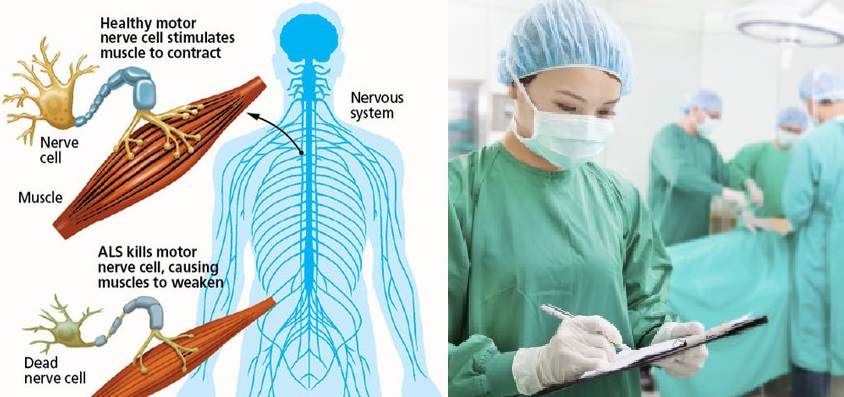Perioperative Management of Neuromuscular Disorders
Motor Neuron Disorders
The perioperative risks result from limitation of pulmonary function, and bulbar muscle paralysis.
Profoundly limited patients may require prolonged postoperative ventilation in an ICU to address both ventilatory and bulbar weakness.
Patients are not at an increased risk for malignant hyperthermia or rhabdomyolysis.
Regional anesthesia seems not to result in clinical deterioration, but it is suggested carefully to limit the neuroaxial block levels to limit the impact on the patient’s respiration.
The use of muscle relaxants is of concern. Succinylcholine is strictly contraindicated in patients with ALS and SMA. Nondepolarizing muscle relaxants may be used, although depending on the individual case, prolonged activity has been described.
Reduced dosing, continuous neuromuscular monitoring, and the use of antagonists (cholinesterase inhibitors [e.g., neostigmine]) is suggested.
Myasthenia Gravis
All patients with neuromuscular disorders have greater sensitivity to the respiratory depressant effects of opioids, barbiturates & benzodiazepines.
Patients with myasthenia gravis are at significant risk for pulmonary complications.
Risk factors that increase the likelihood of postoperative respiratory insufficiency are duration of the disease longer than 6 years, history of chronic respiratory disease, treatment doses of pyridostigmine > 750 mg/day, and preoperative vital capacity under 3 L.
Although preoperative drug treatment may reduce the need for postoperative mechanical ventilation, anticholinesterase drugs should be stopped the day before surgery, if the clinical status of the patient allows it, or on the morning of surgery because they increase the effect of succinylcholine (which is inactivated by plasma cholinesterase) and inhibit the effect of nondepolarizing neuromuscular blocking agents.
The need for anticholinesterase drugs is decreased in the first 48 postoperative hours. These drugs must be restarted carefully and titrated to avoid the risk of a cholinergic crisis.
Plasma exchange is used for patient preparation for surgery (e.g., thymectomy).
Intravenous neostigmine can be used to avoid fluctuating blood levels of these drugs during the perioperative period.
Patients with myasthenia are highly sensitive to nondepolarizing agents, needing only 20 to 50% of the drug compared with other patients. Even small amounts of nondepolarizing agents can cause a significant respiratory muscle paralysis.
Carefully titrated short-acting nondepolarizing muscle relaxants, such as mivacurium or atracurium, should be considered for paralysis.
Succinylcholine should also be avoided.
All the risk factors which predispose to neuromuscular functional impairment must be controlled; e.g., Hypothermia, hypokalemia, and acidosis.
Myopathies
Patients with Duchenne and Becker muscular dystrophy are susceptible to multiple perioperative complications, including to the respiratory, cardiac, and musculoskeletal systems.
The possible presence of cardiac or pulmonary dysfunction needs to be evaluated.
Consideration should be made for pulmonary function testing and echocardiography even in the asymptomatic patient.
The presence of compensated heart failure should modify the anesthetic plan and preparation.
When heart failure is uncompensated, surgery should be delayed.
Acute rhabdomyolysis can result from the use of certain inhalational anesthetic agents, as Duchenne’s muscular dystrophy is a risk for malignant hyperthermia.
Because of the risk association between muscular dystrophy and malignant hyperkalemia after paralysis with succinylcholine, the use of this depolarizing neuromuscular relaxant has fallen out of favor in the field of pediatric anesthesia.

